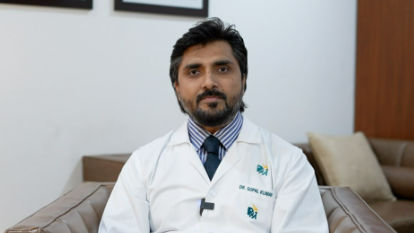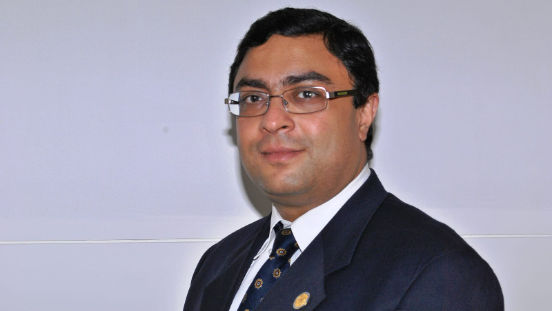Consult Surgical Oncologists Online (88 doctors)

Dr. Ayappan
Surgical Oncologist
19 Years • MBBS, MS, MCh
Chennai
Apollo Hospitals Cancer Centre Nandanam, Chennai
50+ recommendations

Dr. Vishal Mukherjee
Surgical Oncologist
11 Years • MBBS, MS (General Surgery), DNB (General Surgery), DrNB(Surgical Oncology)
Siliguri
Brain and Pain Clinic, Siliguri

Dr. Gopal Kumar
Head, Neck and Thyroid Cancer Surgeon
15 Years • MBBS, MS , FARHNS ( Seoul, South Korea ), FGOLF ( MSKCC, New York )
New Delhi
Apollo Hospitals Indraprastha, New Delhi

Dr Raghuram K
Surgical Oncologist
17 Years • MS (AIIMS, Delhi), M.Ch Surgical Oncology (AIIMS, Delhi)
New Delhi
Apollo Hospitals Indraprastha, New Delhi

Dr. Ashwin Sunil Tamhankar
Surgical Oncologist
8 Years • "MBBS, MS ( General Surgery), MCH ( Urology) Fellowship in Robotic Urology and Uro- Oncology"
Mumbai
Apollo Hospitals CBD Belapur, Mumbai

Dr. Vikash Kumar Agarwal
Surgical Oncologist
20 Years • MS, MRCS, FAMS, FAIS (Robotic Surgeon)
Kolkata
Apollo Multispeciality Hospitals , Kolkata, Kolkata

Dr. Praveen Kumar Garg
Surgical Oncologist
26 Years • MBBS, M.S.(Gen.Surg.), M.Ch.(OncoSurg.)
New Delhi
Apollo Hospitals Indraprastha, New Delhi

Dr. Suvadip Chakrabarti
Surgical Oncologist
16 Years • MCh(Surgical Oncology), MS, FAIS, MBBS, Severance International Fellow, Seoul, South Korea
Kolkata
Apollo Multispeciality Hospitals , Kolkata, Kolkata

Dr Shaikat Gupta Director Surgical Onco
Surgical Oncologist
34 Years • MBBS (University Gold Medalist), MS, FRCSEd
Kolkata
Apollo Multispeciality Hospitals , Kolkata, Kolkata
50+ recommendations

Dr Tapas Kumar Kar
Surgical Oncologist
10 Years • MBBS(Gold Medalist), MS (General Surgery), FAIS, FMAS, FALS(Oncology), Trained (Surgical Oncology), RGCIRC, New Delhi, Consultant Surgical Oncologist
Kolkata
Apollo Multispeciality Hospitals , Kolkata, Kolkata
What is Surgical Oncology?
Surgical oncology is a branch of medicine that deals with the surgical management of cancer. It involves the diagnosis, treatment and management of various types of cancer through surgical procedures. Oncology surgeons are specialised surgeons who have received extensive training in cancer surgery and work closely with other specialists in the field of oncology to provide comprehensive cancer care.
Who is a Surgical Oncologist?
An oncology surgeon is a specialist surgeon who specializes in diagnosing and treating cancer through surgical procedures. These specialists have extensive knowledge and expertise in various surgical techniques including minimally invasive surgeries, robotic surgeries and laparoscopic surgeries. They work collaboratively with other oncology specialists including medical and radiation oncologists, to provide the best possible care for their patients.
When Should You Consult a Surgical Oncologist?
If you have been diagnosed with cancer or have symptoms that suggest you may have cancer, you should consult a surgical oncologist. Surgical oncologists are trained to diagnose cancer early and provide appropriate treatment options that can improve your chances of successful recovery.
Some common symptoms that may indicate the presence of cancer include:
1. Unexplained weight loss
2. Persistent cough
3. Abnormal bleeding or discharge
4. Changes in bowel or bladder habits
5. Unexplained pain or fatigue
If you experience any of these symptoms, it is important to seek medical attention promptly.
What Medical Conditions Do Surgical Oncologists Treat?
Surgical oncologists are trained to treat various types of cancer using surgical procedures. Some common types of cancer treated by surgical oncologists include:
1. Breast cancer
2. Lung cancer
3. Colon cancer
4. Liver cancer
5. Pancreatic cancer
6. Prostate cancer
7. Ovarian cancer
What Are the Different Types of Procedures Conducted by Surgical Oncologists?
Surgical oncologists use various surgical techniques to treat cancer. Some common types of procedures include:
1. Biopsy: A biopsy is a procedure where a small tissue sample is removed from the tumour for testing. This helps in identifying the type of cancer and determining the stage of cancer.
2. Curative surgery: Curative surgery is a procedure that removes the entire tumour from the body, along with any surrounding tissue that may contain cancerous cells.
3. Palliative surgery: Palliative surgery is a procedure performed to relieve symptoms caused by cancer, such as pain or difficulty in breathing.
4. Lymph node dissection: Lymph node dissection involves removing the lymph nodes near the tumour to check if the cancer has spread to other parts of the body.
5. Reconstruction surgery: Reconstruction surgery is a procedure done to restore the appearance or function of the affected body part after the removal of a tumour.
In addition to treating cancer, surgical oncologists may also perform diagnostic procedures such as biopsies to confirm a cancer diagnosis.
How Can I Consult a Surgical Oncologist?
If you have been diagnosed with cancer or have symptoms that suggest you may have cancer, you can consult a surgical oncologist by scheduling an appointment with a hospital or clinic that specialises in cancer care.
To consult with a surgical oncologist, you will need a referral from your medical oncologist or radiation oncologist. After receiving a referral, you can schedule an appointment with the surgical oncologist on Apollo 24/7. During your first appointment, the surgical oncologist will discuss your medical history and perform a physical exam. They may also order additional tests such as blood tests, imaging studies such as X-rays, CT scans or MRIs or biopsies to diagnose and determine the extent of cancer.
If you or someone close to you has been diagnosed with cancer, it is important to seek consultation with a surgical oncologist to help determine the best treatment plan. You can seek an appointment with the best oncology surgeons in India at Apollo 24|7 through our website or app.
The Role of Surgical Oncologists in Healthcare
Surgical oncologists play a critical role in providing comprehensive cancer care to patients. They work closely with other specialists in the field of oncology to develop personalised treatment plans that are tailored to each patient's unique needs. They also provide ongoing support and follow-up care to help patients manage their condition and achieve the best possible outcome.
In conclusion, if you are diagnosed with cancer or have symptoms that suggest you may have cancer, consulting a surgical oncologist is essential. These highly skilled specialists are trained to diagnose and treat various types of cancer through surgical procedures and play a critical role in the overall management of cancer. By seeking prompt medical attention and working collaboratively with your surgical oncologist, you can improve your chances of successful recovery and lead a healthy, fulfilling life.
You will find the best oncology surgeons in India at Apollo 24|7. Book an appointment today to access expert opinion, accurate diagnosis and treatment for cancer. Contact a specialist today!
Surgical Oncologists in Other Top Cities
- •Best Surgical Oncologists in Chennai
- •Best Surgical Oncologists in New Delhi
- •Best Surgical Oncologists in Hyderabad
- •Best Surgical Oncologists in Kolkata
- •Best Surgical Oncologists in Bengaluru
- •Best Surgical Oncologists in Ahmedabad
- •Best Surgical Oncologists in Karimnagar
- •Best Surgical Oncologists in Mumbai
- •Best Surgical Oncologists in Noida
- •Best Surgical Oncologists in Bhubaneswar
- •Best Surgical Oncologists in Bilaspur
- •Best Surgical Oncologists in Chinagadila
- •Best Surgical Oncologists in Lucknow
- •Best Surgical Oncologists in Madurai
- •Best Surgical Oncologists in Mysuru
- •Best Surgical Oncologists in Akola
- •Best Surgical Oncologists in Arepally
- •Best Surgical Oncologists in Banglore
- •Best Surgical Oncologists in Guwahati
- •Best Surgical Oncologists in Hyderguda
Doctors in Top cities
- •Top Doctors in Hyderabad
- •Top Doctors in Bengaluru
- •Top Doctors in Chennai
- •Top Doctors in Kolkata
- •Top Doctors in Mumbai
- •Top Doctors in New Delhi
- •Top Doctors in Pune
- •Top Doctors in Bangalore
- •Top Doctors in Delhi
- •Top Doctors in Gurugram
- •Top Doctors in Noida
- •Top Doctors in East Godavari
- •Top Doctors in Ahmedabad
- •Top Doctors in Lucknow
- •Top Doctors in Ghaziabad
- •Top Doctors in Visakhapatnam
- •Top Doctors in Guwahati
- •Top Doctors in Madurai
- •Top Doctors in Bhubaneswar
- •Top Doctors in Vijayawada
Related Services
Related Treatments
- •Treatment for Breast Cancer
- •Treatment for Acute Diarrhea Treatment
- •Treatment for Bladder Cancer
- •Treatment for Adrenal cancer
- •Treatment for Ampullary cancer
- •Treatment for Bile Duct Cancer Cholangiocarcinoma
- •Treatment for Breast Cancer Screening
- •Treatment for Adolescent and Young adult Cancers
- •Treatment for Anal Cancer
- •Treatment for Blood Cancer
- •Treatment for Brain Cancer Treatment
- •Treatment for Bone Cancer
- •Treatment for Brachydactyly
- •Treatment for Adopted Child Syndrome Treatment
- •Treatment for Adrenal Masses
- •Treatment for Ankle Pain
- •Treatment for Arthritis Physiotherapy
- •Treatment for Blocked Blood Vessels
- •Treatment for Breast cysts
- •Treatment for Breast Lump Treatment
FAQs
What is the difference between surgical oncology and medical oncology?
Surgical oncology focuses on the surgical treatment of cancer, while medical oncology deals with systemic treatments such as chemotherapy and immunotherapy.
How does a surgical oncologist determine the extent of cancer in a patient?
A surgical oncologist may use diagnostic imaging tests like MRI, CT scan and PET scan to identify the location and size of cancerous tumours.
What are some common procedures performed by an onco surgeon?
A surgical oncologist may perform procedures like tumour resection, lymph node biopsy and reconstructive surgery.
What is the role of an oncology surgeon in a patient's care team?
An onco surgeon works collaboratively with other specialists such as medical oncologists, radiation oncologists and pathologists to develop a treatment plan tailored to each patient's needs.
How long does it take to recover from surgery for cancer?
Recovery time varies depending on the type and extent of surgery performed. In some cases, patients may require several weeks of rest before returning to normal activities.
What are some potential risks or complications associated with oncology surgery?
Risks and complications can vary depending on the location and extent of surgery but some potential risks may include bleeding, infection or damage to surrounding tissues or organs.
How does a surgical oncologist prioritise treatment options for patients?
Treatment options are based on a variety of factors including the type and stage of cancer, the patient's overall health and their individual preferences and goals for treatment.
Are there any alternative treatments available for cancer besides surgery?
Other treatments may include chemotherapy or radiation therapy, as well as newer therapies such as immunotherapy or targeted therapies.
Can cancer be cured through surgery alone?
In some cases, surgery may be sufficient to remove cancerous tumours and prevent a recurrence. However, in other cases, surgery may be combined with other treatments such as chemotherapy or radiation therapy.
Can surgical oncology help manage cancer-related pain?
Pain management is an important aspect of cancer care and surgical oncologists work collaboratively with pain management specialists to ensure patients receive appropriate treatment for their symptoms.